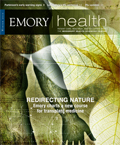Calm mind, healthy body

There's an emerging story about your immune system, and it goes like this.
Let's say you get a splinter in your finger, and it has a bunch of bacteria on it. Your immune cells, called macrophages, begin to secrete chemicals called cytokines. Cytokines, along with other chemicals, flood the area with the aim of destroying the bacteria and stopping their spread. But cytokines also damage surrounding tissue, causing inflammation. Inflammation can wreck havoc throughout the body.
And here's the moral of this story: researchers now know that stress, not just illness, activates cytokine molecules and thus inflammation. Yet data show that people who practice meditation may reduce their inflammatory and behavioral responses to stress, which are linked to serious illnesses, including cancer and heart disease.
One type of meditation, called focused meditation, aims to refine and enhance attention and calm the mind by focusing on one thing such as breathing. Compassion meditation, as its name suggests, is designed to cultivate compassion—that is, enhancing one's ability to empathize with the anguish, distress, and suffering of others.
Secular compassion meditation is based on a thousand-year-old Tibetan Buddhist mind-training practice called "lojong." Lojong uses a cognitive, analytic approach to challenge a person's unexamined thoughts and emotions toward other people, with the long-term goal of developing altruistic emotions and behavior toward all people.
While focused meditation has garnered a fair amount of attention from researchers, less is known about compassion meditation and its effects on the mind and body, says Geshe Lobsang Tenzin Negi, who has designed a meditation program for ongoing studies at Emory on inflammation and meditation. (See box below.) Charles Raison, clinical director of the Emory Mind-Body Program, is leading those studies.
"Our findings suggest that meditation practices designed to foster compassion may impact physiological pathways that are modulated by stress and relevant to disease," says Raison. With Emory colleagues, he is studying how stress and the immune system interact to make people depressed when they're sick and sick when they're depressed.
"Anything that affects the normal functioning and integrity of the body tends to activate a part of the immune system that's called inflammation," says Raison. "It includes processes that the immune system uses to deal with virus or bacteria, or anything foreign and dangerous."
Based on promising early findings from Raison's ongoing study, Emory has developed compassion meditation classes for patients and caregivers at the Winship Cancer Institute who might benefit. Raison and Negi also are collaborating with the Emory Predictive Health Institute to study long-term effects of compassion meditation on health and well-being. —Robin Tricoles
Mastering meditationGeshe Lobsang Tenzin Negi sits cross-legged before the ornate altar. Spiritual director of Atlanta's Drepung Loseling Monastery, Negi makes meditating look easy, but it's not. Mastering meditation takes dedication and time. Yet dutiful beginners can quickly grasp its value and meaning. A senior lecturer in Emory's religion department, Negi and colleagues study the physical and mental benefits of meditation. They've enlisted students, staff, and even patients to learn more about the effects of different types of meditation. "Meditation is not just about sitting quietly," says Negi. "It is a process of familiarizing, cultivating, or enhancing certain skills, and you can think of attentiveness and compassion as skills." The Emory-Tibet Partnership forged an innovative study in 2005 to examine the impact of compassion meditation in treating depression among undergraduates. Founded in 1998, the partnership brings together Western and Tibetan Buddhist intellectual traditions for mutual enrichment and discovery of new knowledge. "Bringing this knowledge together is going to be tremendously helpful to humanity and personal well-being and health," says Negi. —Robin Tricoles |
||||


